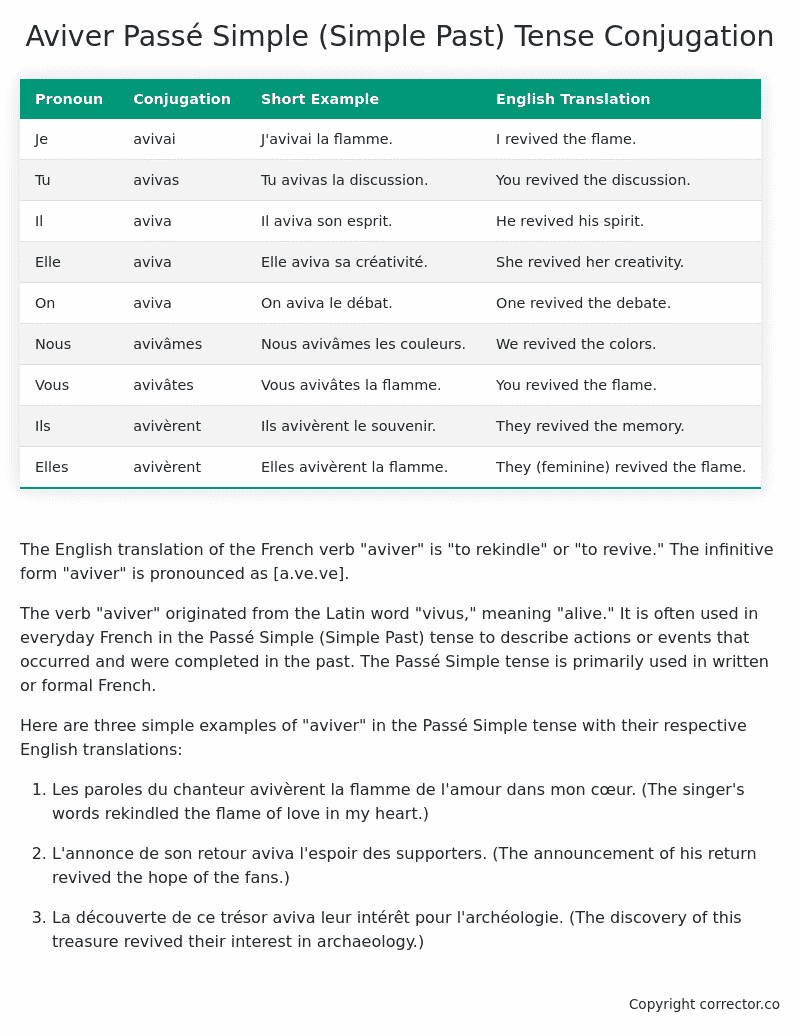Passé Simple (Simple Past) Tense Conjugation of the French Verb aviver
Introduction to the verb aviver
The English translation of the French verb “aviver” is “to rekindle” or “to revive.” The infinitive form “aviver” is pronounced as [a.ve.ve].
The verb “aviver” originated from the Latin word “vivus,” meaning “alive.” It is often used in everyday French in the Passé Simple (Simple Past) tense to describe actions or events that occurred and were completed in the past. The Passé Simple tense is primarily used in written or formal French.
Here are three simple examples of “aviver” in the Passé Simple tense with their respective English translations:
-
Les paroles du chanteur avivèrent la flamme de l’amour dans mon cœur.
(The singer’s words rekindled the flame of love in my heart.) -
L’annonce de son retour aviva l’espoir des supporters.
(The announcement of his return revived the hope of the fans.) -
La découverte de ce trésor aviva leur intérêt pour l’archéologie.
(The discovery of this treasure revived their interest in archaeology.)
Table of the Passé Simple (Simple Past) Tense Conjugation of aviver
| Pronoun | Conjugation | Short Example | English Translation |
|---|---|---|---|
| Je | avivai | J’avivai la flamme. | I revived the flame. |
| Tu | avivas | Tu avivas la discussion. | You revived the discussion. |
| Il | aviva | Il aviva son esprit. | He revived his spirit. |
| Elle | aviva | Elle aviva sa créativité. | She revived her creativity. |
| On | aviva | On aviva le débat. | One revived the debate. |
| Nous | avivâmes | Nous avivâmes les couleurs. | We revived the colors. |
| Vous | avivâtes | Vous avivâtes la flamme. | You revived the flame. |
| Ils | avivèrent | Ils avivèrent le souvenir. | They revived the memory. |
| Elles | avivèrent | Elles avivèrent la flamme. | They (feminine) revived the flame. |
Other Conjugations for Aviver.
Le Present (Present Tense) Conjugation of the French Verb aviver
Imparfait (Imperfect) Tense Conjugation of the French Verb aviver
Passé Simple (Simple Past) Tense Conjugation of the French Verb aviver (You’re reading it right now!)
Passé Composé (Present Perfect) Tense Conjugation of the French Verb aviver
Futur Simple (Simple Future) Tense Conjugation of the French Verb aviver
Futur Proche (Near Future) Tense Conjugation of the French Verb aviver
Plus-que-parfait (Pluperfect) Tense Conjugation of the French Verb aviver
Passé Antérieur (Past Anterior) Tense Conjugation of the French Verb aviver
Futur Antérieur (Future Anterior) Tense Conjugation of the French Verb aviver
Subjonctif Présent (Subjunctive Present) Tense Conjugation of the French Verb aviver
Subjonctif Passé (Subjunctive Past) Tense Conjugation of the French Verb aviver
Subjonctif Imparfait (Subjunctive Imperfect) Tense Conjugation of the French Verb aviver
Subjonctif Plus-que-parfait (Subjunctive Pluperfect) Tense Conjugation of the French Verb aviver
Conditionnel Présent (Conditional Present) Tense Conjugation of the French Verb aviver
Conditionnel Passé (Conditional Past) Tense Conjugation of the French Verb aviver
Conditionnel Passé II (Conditional Past II) Tense Conjugation of the French Verb aviver
L’impératif Présent (Imperative Present) Tense Conjugation of the French Verb aviver
L’impératif Passé (Imperative Past) Tense Conjugation of the French Verb aviver
L’infinitif Présent (Infinitive Present) Tense Conjugation of the French Verb aviver
L’infinitif Passé (Infinitive Past) Tense Conjugation of the French Verb aviver
Le Participe Présent (Present Participle) Tense Conjugation of the French Verb aviver
Le Participe Passé (Past Participle) Tense Conjugation of the French Verb aviver
Struggling with French verbs or the language in general? Why not use our free French Grammar Checker – no registration required!
Get a FREE Download Study Sheet of this Conjugation 🔥
Simply right click the image below, click “save image” and get your free reference for the aviver Passé Simple tense conjugation!

Aviver – About the French Passé Simple (Simple Past) Tense
Formation
Usage
Narration
Historical Context
Interactions with other tenses
Passé Composé
Imparfait
Conditional and Subjunctive
Summary
I hope you enjoyed this article on the verb aviver. Still in a learning mood? Check out another TOTALLY random French verb conjugation!


